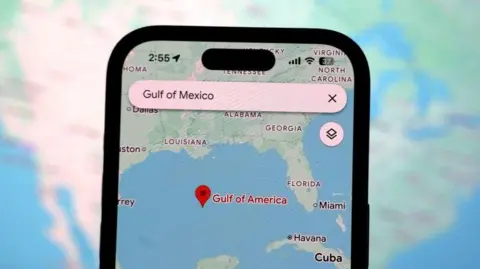In a recent development, Google Maps has come under scrutiny for its decision to change the name of the Gulf of Mexico to “Gulf of America” for users located in the United States. This controversial move has prompted the tech giant to disable the ability for users to post reviews related to the Gulf location. Users attempting to engage with the Gulf on Google Maps are now greeted by a message indicating that “posting is currently turned off,” which has ignited discussions about censorship and the power large tech companies hold over public discourse.
The name change appears to coincide with an order from former President Donald Trump, who directed that the Gulf be referred to as “Gulf of America” in official government documents. Following this directive, Google implemented the adjustment in its mapping service, sparking backlash from various stakeholders, including individuals who feel that the renaming is inappropriate or misrepresentative of the region. Reports suggest that Google has not only restricted reviews but has also deleted several negative comments made in opposition to the name change, raising concerns about transparency and the management of user-generated content on its platforms.
Social media platforms have quickly amplified dissatisfaction surrounding the name change. Many users claimed they have experienced a deletion of their critical reviews and expressed feelings of being silenced by Google’s actions. This incident feeds into a larger trend known as “review-bombing,” where users collectively post negative reviews to express their disapproval or protest against a company or its policies. An example of this occurred in 2020, when users took to app stores to criticize measures taken to ban the popular social media platform TikTok, leaving critical feedback on app ratings as a form of protest.
The tech community is increasingly aware that companies like Google actively monitor and manage review submissions to deter abuse. Google’s mechanisms include algorithms designed to detect unusual spikes in ratings and reviews, which may prompt the platform to suspend contributions for certain locations or remove content that violates its guidelines. Nevertheless, some critics argue that these measures can also serve to shield companies from legitimate user feedback, raising questions about the extent of control they exert over online user interactions.
In addition to Google, Apple has also adapted its mapping service in accordance with the new naming convention. The White House recently showcased this change via a post on a social media site, which included a visual proof of Apple Maps reflecting “Gulf of America” for its US users, further legitimizing the name change in the eyes of some officials.
This landscape of digital and political influence includes international dimensions as well, with Mexico’s President, Claudia Sheinbaum, addressing Google in a letter to express her disapproval of the name change. She requested that the company refrain from renaming the Gulf, emphasizing a respect for established regional identities. In a move showcasing the complexities of digital globalization, Google has stated that the name change would not affect how users from Mexico view the Gulf, while users globally will see “Gulf of America” in parentheses alongside the existing name.
According to Forbes, Google had seemingly acknowledged the removal of critical reviews regarding the renaming of the Gulf and its implications. The company attributed the name change to its long-standing policy of aligning geographical names with government-sanctioned updates—a practice that has now garnered significant public discourse. As such, the actions undertaken by Google, along with reactions from users and global leaders, demonstrate the intricate relationship between technology, identity, and the representation of cultural geography in the digital age. The ongoing debates and consequences of this name change may serve as a pivotal moment for how tech companies navigate local sentiment while implementing official government directives.











